"Woody Guthrie: Natural born anti-fascist," by Stetson Kennedy
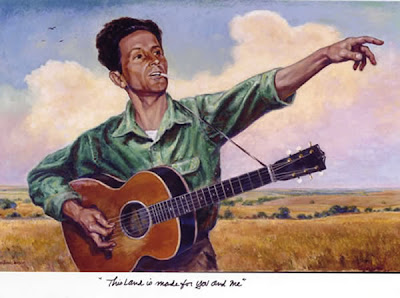
“Do you have any evidence of Woody having ever committed any disloyal act?” my lawyer/friend/neighbour asked the two FBI agents who had dropped into his office to ask if it were true that “one Woodrow Wilson Guthrie” was staying at my home on the outskirts of Jacksonville, Florida.
“Well, there’s this,” one of them replied, fishing from his briefcase an 8x10 photograph of Woody holding his guitar with the inscription writ large across its face, THIS MACHINE KILLS FASCISTS!
It did, too. From the very first moment that fascism reared its head on the world scene - first in Mussolini’s Italy, then aped in Hitler’s Nazi Germany, and then imposed by the two of them in Franco’s Falangist Spain - Woody was singing his heart out against it. And long after the Axis defeat in 1945, Woody remained a militant anti-fascist until he drew his last breath on 3 October 1967.
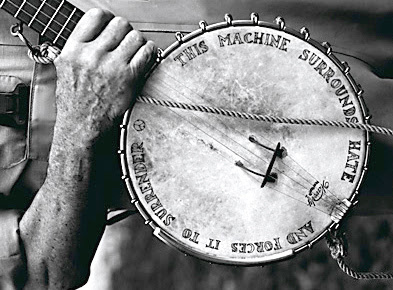
That figures, because fascism was the mortal enemy of everything Woody believed in - people, unions, democracy, human rights, justice, peace, world brotherhood, you name it.
So Woody didn’t have to wait until Mussolini gloated, “We fascists have ridden roughshod over the putrid corpse of parliamentary democracy, and will do so again if need be!” or for Il Duce’s son-in-law Count Ciano to report how “troops of Ethiopian horsemen blossomed like roses when bombed from the air”. Or for Hitler to spell out in Mein Kampf his master plan for 1,000 years of world dominion, and a “final solution for European Jewry”. Or the Axis-backed fascist overthrow of the republican government of Spain. Much less the tardy US declaration of war against the Axis.
Fact is, a lot of us cut our political wisdom teeth on the works of those British socialists, Sidney and Beatrice Webb, who ended one of their 1930s books with the question, “What are we to do?” and answered “Build the Popular Front against fascism!”
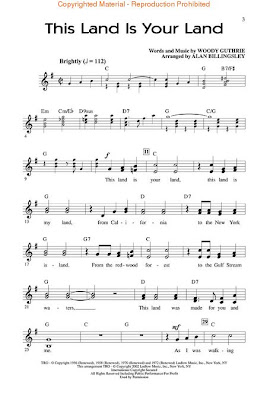
Like the book Hard-Hitting Songs for Hard-Hit People, which Woody put together with folk musicologist Alan Lomax in 1941, Woody’s life work consisted of making up and singing songs to strengthen the arm of the poor, and especially their unions, in their struggle to shake off the shackles of the rich. Since the function of fascism was the exact opposite, Woody was what you might call a natural-born anti-fascist.
But he said it - and sang it - best. During World War II the US Office of War Information hired him to write some “morale-building songs”, but his were so explicitly anti-fascist not one was ever released. (The War Department did put out a four-page booklet to tell servicemen what fascism was all about, but Congress made them recall it. Hasn’t been seen since.)
“There ain’t but two sides, the working people’s side and the big bosses’ side,” Woody wrote. “The union side and the Hitler side. The first thing that Hitler cracked down on when he took the Nazi Chamber was the Trade Unions. And it will be the Trade Unions that beat Hitler. The best job you can do for your country, next to being a good soldier for the working people.
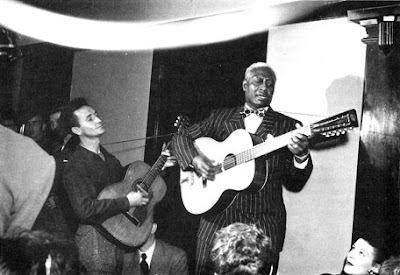
“You don’t have to go to Europe to find plenty to do to beat Hitler, stick up for what’s right, freedom of speech, press, radio, meetings, collective bargaining, the right to get together for decent pay, hours, rent, prices … The biggest thing that’s happening right now in the United States is us.”
That was the stuff Woody’s songs were made of. He didn’t mind others singing about love and such, but as far as he was concerned, “A song that don’t say somethin ain’t worth nothin”. Of course, what his were worth, and what they fetched, were two very different things. I remember getting many a mimeographed, self-illustrated copy in the mail, scrawled over in Woody’s hand, “Here is my latest song. Hope you like it. If so, please send 25c.”
It was much the same when it came to collecting even the $25 honorarium Woody generally got for singing on stage.
“But it’s for a Good Cause!” protested one sponsor who wanted him to sing for free.
“I don’t sing for bad causes,” was Woody’s rejoinder.
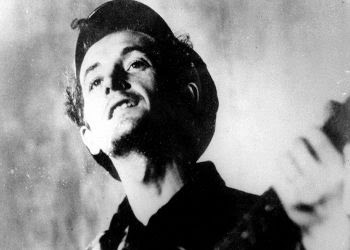
Woody was never the armchair anti-fascist, mind you. When he received a wartime telegram saying “Got a dish-washing job on a Liberty Ship,” he jotted in his Notebook:
Woman a-cryin
and me a-flyin
out the door
and down the line!
According to his sidekick Cisco Houston, when one of those ships carrying material to Britain and the Soviets was torpedoed (despite Woody’s prayers against “tin-fish”) he grabbed his guitar and kept playing, in the heroic tradition of dance bands when fire breaks out in the ballroom.
And when a sister ship went down with all hands on board, Woody sang (as if in anticipation of all the names engraved on the Vietnam Memorial wall in Washington):
Tell me, what were their names, boys,
what wurrr their names?
Did you have a friend
On that good Reuben James?
Woody was rightfully proud of his membership in the National Maritime Union and kept paing his dues long after he came ashore.

Like all true folk philosophers he could say a lot in a few words, for example, “If we would just take the profit out of war, there wouldn’t be any”.
In a 4 March 1942 entry in his Notebook for a letter to his unborn son, Woody had this to say:
“Maybe I should talk to you about fascism. It is a big word and it hides in some pretty little places. It is nothing in the world but greed for profit and greed for the power to hurt and make slaves out of the people… But fascism can no more control the world than a bunch of pool hall gamblers and thugs can control America. Because all of the laws of man working in nature and history and evolution say for all human beings to come always closer and closer together…
“How come me launching into a talk about fascism to you - only 4 months on the way - not even here yet? Because in the whole big world… fascism and freedom are the only two sides battling… every other shades into the fight somewhere, I’m not worried about where you’ll be standing - but - how could I ever get this book wrote full unless some of it was cussing out facism?
Like Tom Joad said to his dying mother in Steinbeck’s Grapes of Wrath, “wherever working people are fighting for their rights, I’ll be there”. That was Woody, all the way…
We were all very confident back then - as Pete Seeger has never tired of singing - that there was “a better way on the way”. Woody often put it in terms of a great day coming in which we (the human race) would all be members of “One Big Union”.

One of the most everlasting of Woody’s countless contributions is his song, This Land Is Your Land, which has virtually replaced America (that rewrite of God Save the King) as the US national anthem. Its refrain:
This Land is your land,
This land is my land,
This land belongs to you and me…
This song has taken root in the heart of Americans of all ages - all the title deeds to the contrary not withstanding. That Woody was not unaware of this complication was evidenced by his gentle yet firm revolutionary admonition for us to “take it easy, but take it!”
That Woody’s prenatal exhortations against fascism did not fall on deaf ears is attested by Arlo Guthrie’s singing career. That word fascism may still be understood on the eastern side of the Atlantic, where it wreaked the most havoc, but it is still almost unheard of in the USA today. (Recently when a student-made transcript of an interview with me came back from the oral history archive at the University of Florida, it read, “Following the faddist invasion of Spain…”)
During the 1950s, when McCarthyite witch-hunting was at its peak, Alan Lomax was in London and I was in Budapest, and we both begged Woody to pack up his guitar and songbag and come to Europe. He never made it in the flesh, but as a legendary folk hero Woody Guthrie lives on in people’s struggles around the world.
Just for fun, before concluding let me speak to two apolitical components of the Legend of Woody Guthrie: that he slept with his boots on, and ate standing up. The former was often true, and I have concluded that the habit was acquired during his hoboing years, when one needed to be ready to run when aroused by a railroad cop. And he did on occasion rise from a dining table and take his plate to a shelf or mantlepiece. His own explanation: there were no tables in a hobo jungle, nor around the chuck wagons of the Dust Bowl refugees.
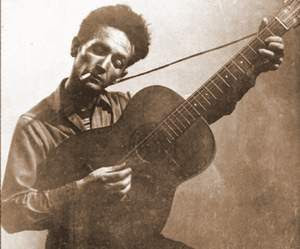
But the Legacy of Woody Guthrie, which will always stand mankind in good stead, is the necessity for solidarity in throwing off the yoke of oppressors, and building a better world of peace and justice.
One of my fondest memories of Woody is May Day 1947, when we marched together in the writers’ contingent of the parade of progressives in New York City. When we reached Union Square, Woody climbed up on a ledge protruding from a bank, the better to hear the speakers. A cop spotting him from the other side of the square came charging with his billystick and bellowing, “Get offa that bank!”
Woody climbed down with the utmost dignity, saying, “Very well officer, but a little courtesy please. Don’t forget I help pay your salary.”
Afterwards when the two of us were driving to upstate New York for some meeting, when Woody’s time came at the mike he plucked at his scalp (as he often did, as if for lice) and told the audience:
“On the way up here listening to the car radio we heard the announcer talking about what a fine May Day parade the Mayor and all the Big Shots and American Legion had down Fifth Avenue, and how all of us Lefties ‘got lost in the shuffle over on Eighth Avenue’ … The way I see it, that’s what we’ve gotta do - keep shufflin’ …” (source: Searchlight)
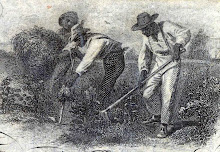
No comments:
Post a Comment